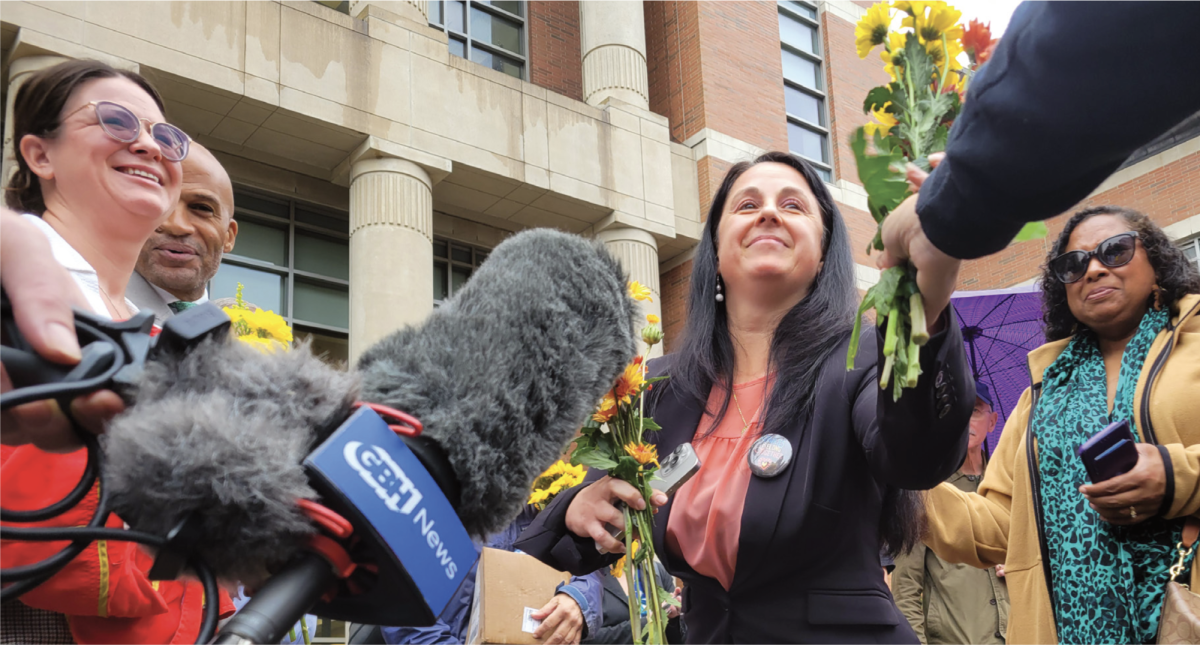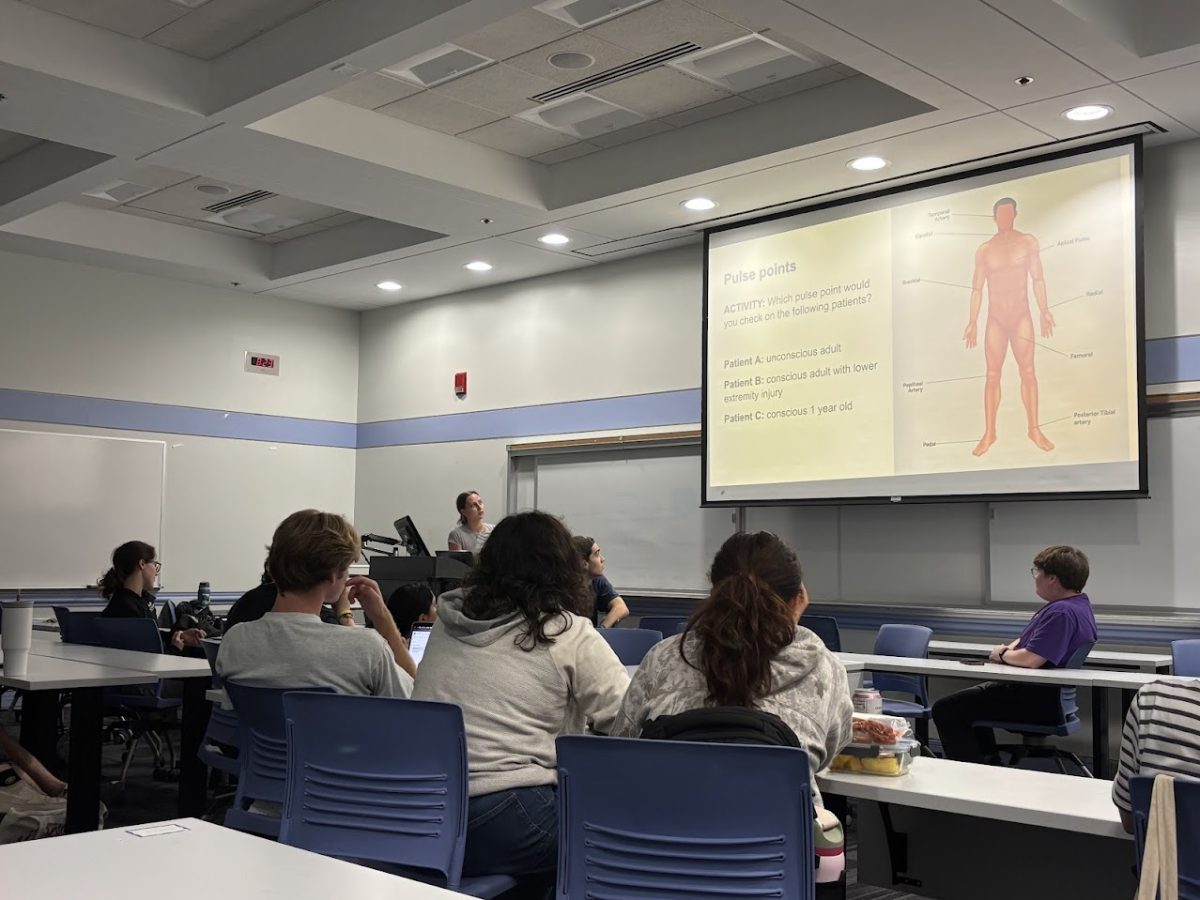On Thursday, Sept. 25, Worcester City Councilor Etel Haxhiaj appeared in court to defend herself against criminal charges that were brought in response to her actions during a U.S. Immigration and Customs Enforcement arrest that happened on Eureka Street in May 2025. Beginning at 8:30 a.m., around 60 people rallied outside of the Worcester District Court. Many had signs, with some saying “Etel is 4 us! WPD is 4 ICE” and “We stand with Etel.”
Two court officers approached people rallying to talk about why they were outside rallying in support for Haxhiaj. Later on, another court officer approached the ralliers to tell them that, according to state law, they could not impede and attempt to influence an ongoing court case, and asked the ralliers to move across the street, as they could not be on court property. The group moved away from the steps and closer to the road.
“I wanted to support Etel… She’s such a small of stature, but great of strength, and I just want to be here to support her,” said Worcester resident Daria Meshenuk.
Inside the courtroom, the judge first heard arguments regarding the dismissal of charges against Ashley Spring. Spring, another community member who was at the scene of the I.C.E. arrest, had initially been charged with “assault and battery with a dangerous weapon” over allegedly spraying water from a baby bottle upon an officer. However, this charge was willingly withdrawn by the prosecutor at a hearing back in July, leaving three less serious but still criminal charges against her.
Spring’s attorney Carlton Williams argued for dismissal of the remaining charges. He highlighted that, despite the most serious charge having been withdrawn, the charge of “assault and battery of a police officer” still remained, even though police body-worn camera footage never showed Spring pushing any officers. Williams also argued that the prosecution had been distorting or omitting key facts, and that this constituted grounds for dismissal, placing an undue burden on the defendant to potentially accept a plea deal. He also noted the negative impact these charges have had on Spring, who was forced to leave her job as a school nurse due to the subsequently-dropped felony charge, and has also had to leave Worcester entirely and live in Florida.
Next, prosecutor Steven E. Gagne began his arguments by explaining that the reason he withdrew the “assault and battery with a dangerous weapon” charge was that it was clear from the body-worn camera footage that the liquid being sprayed from the baby bottle was just water, and the police officers could be heard reacting to it with the understanding that it was water.
However, Gagne argued that the video does show Spring spraying water, which had “startled and distracted” the officers, and that they didn’t know immediately that it was water. It was this water spraying, he stated, that amounted to the “assault and battery of an officer” charge against Spring, and clarified that they were not contending that she pushed or shoved any officers physically.
Spring’s attorney pushed back on what he argued was an improper switch made by the prosecution. Williams stated that the original theory the prosecution had made for that charge was that Spring physically pushed an officer. Now, Williams said, the prosecution was essentially trying to completely switch the theory behind the charge, which he argued was improper. Gagne rebutted by arguing that the incident in question was still at the same date and time and thus it was fine for the charge to stay the same.
Next, the judge heard arguments regarding the dismissal of charges for Etel Haxhiaj. Haxhiaj’s attorney, Elizabeth K. Halloran, stated that during the clerk magistrate hearing, the statement of facts alleged that Haxhiaj pushed an officer in the chest. However, Halloran argued that transcript evidence and officer body-worn camera footage show that Haxhiaj told the officer, “Please don’t touch me,” while displaying both hands and moved away from the officer. She also noted that Haxhiaj appeared in the video to be pulled towards the officer’s chest, and emphasized that nowhere in any of the video footage is there evidence that Haxhiaj shoved an officer.
Halloran noted that the video does show an officer grabbing Haxhiaj’s arm and her arm proceeding to flail, which was followed by her asking the officer not to touch her. Halloran argued that this is not indicative of Haxhiaj doing any touching. Halloran was clear that their position is that Haxhiaj did not touch the officer, but also notes that even if there was any touching, it was not intentional and not likely to cause harm, which means it falls short of constituting “assault and battery.” Any touch that may have happened was simply a bodily reaction to being physically grabbed by the officer.
Halloran did note that there is case law which stipulates that a person may be justified in using reasonable force against an officer if an officer is using unnecessary force against them. She made clear this was not what the defense was claiming happened, but used it to argue that accidentally touching in response to being grabbed would not rise to the level that constitutes “assault and battery.”
On the charge of “interfering with police,” Halloran noted that the burden for the prosecution was to establish “willful physical obstruction and hindrance to officers.” She stated that the scene with I.C.E. at Eureka St. was very chaotic, and while Haxhiaj did stand between people and agents, she was not intending to interfere with police. She argued that the prosecution had failed to establish probable cause that she interfered with police business.
Gagne responded by arguing that these issues should be decided by a fact-finder at trial (either a jury or a judge in the event of a bench trial). Whether or not a touch was intentional should be left for the fact-finder, he said.
Gagne also emphasized that, after the magistrate had reviewed all the evidence, the magistrate thought that Haxhiaj was asked by an officer to move away and was told that she could be charged, but still chose not to move. He also asserted that, after being physically moved by the officer, Haxhiaj shoved back intentionally. Gagne concluded by arguing that the evidence meets the burden of probable cause and stated that this was in line with the magistrate’s ruling.
Outside the courthouse, Haxhiaj and Spring were greeted with cheers by their supporters, and both gave brief remarks. “This has been incredibly difficult, and it will continue to be incredibly difficult,” Spring said, and proceeded to thank the people gathered for the support they have shown her.
Haxhiaj maintained her innocence, describing the charges as “politically motivated,” and vowed to continue to fight them.
“I don’t think any of us want to live in a country, a state, or a city, where masked men are snatching people off our neighborhoods, and elected leaders and community members are dragged to court for protecting our constituents,” said Haxhiaj.
“Political leaders, elected to protect their constituents, ask questions and provide oversight, are being targeted, harassed, and threatened across the country. This frightening national trend where political adversaries are singled out for retribution is now, unfortunately, playing out in Worcester,” stated Haxhiaj.
The judge agreed to take both Spring and Haxhiaj’s matters under advisement, and scheduled status hearings for both cases in Nov.




